Viking nostalgic boat building technique
We humans have been building boats out of wood for thousands of years. Today, wood boats are not easily mass-produced like fiberglass boat. It could therefore be easily assumed that wooden boats today are obsolete.
Most European people, have heard of the famous, or infamous, Viking ships:

Picture: The Viking ships were always built of hard wood and overlapping planks. The ships were known to be symmetrical, flexible, slim and decorated with beautiful equipment and dragon heads.
The Vikings had major advantages with such advanced ships that could travel over large areas. Their voyages ranged from different areas in Scandinavia, Iceland, Ireland, Newfoundland, Black Sea and Africa. In this article I wanted to write about the building technique that originates from the Viking age, and before that even, and is still used today and can be seen along the southern coast of Norway.
Now, not everyone agrees with me in this, but some people i Norway when an "old" (you find newer ones as well) wooden boat pass them by, they will probably say either: "thats realy slow...", or "thats an work of art". We humans like to see beautifull things with our eyes. Sure, these "old" boats dont look like a modern Tesla with tons of electronic stuff in it, park on its own, hydrolic elevators, radar, and so on and so forth. No, these old wooden boats are just simple, and practical. We humans also tend to get a deeper respect and can see the beauty of an object when we know how much energy is put into the object.
This pictures is from a excavating site where they found this ancient vikingship:
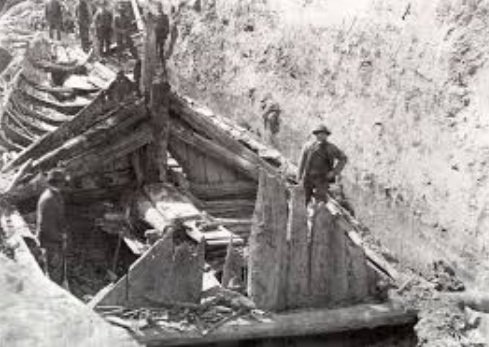
Picture: This excavating took place around 1880
As you probably know (or not) Norway has a very long coast & abundant of fjords, compared to many other countries. Therefore, naturally the boat has always played a major role in nutrition and communication for us thousands of years, and the boat building technique is evenly so, old. Going back to the iron age, we have had boats. Here is the same Viking ship that i showed a picture of above, restored to its former glory, and can be seen today in Oslo museum:
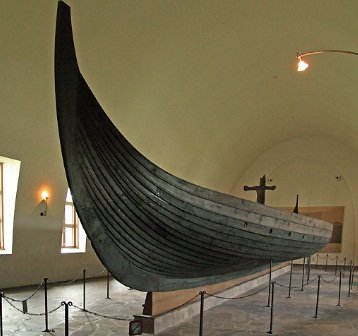
Picture: Archeologists assume that this viking ship is built aprox. in the 800 century.
So, since the Viking age, and before that, we see evidence of the clinker technique. Wooden clinker building technique as a craft, consists of building boats out of planks (thin planks), partly overlapping each other. It look like this:
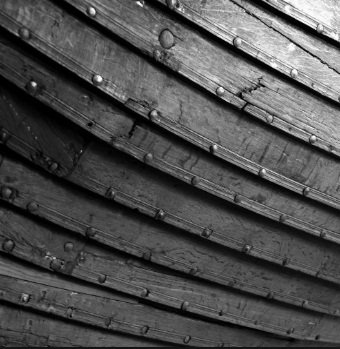
Picture: This is a close up from the same Viking ship where you see the overlaying planks and nails.
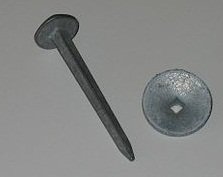
Picture: This is how the nails would look like. They use tar to seal the holes where the nails went through afterwards.
The clinker construction techniques involve fastening together an overlapping layer of planks with straight nails (clinker). Its best to see what i mean by looking at this picture:
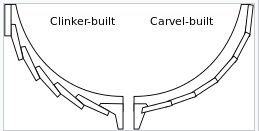
Picture: Here you see two different techniques of putting the wooden planks together.
The boat builder would start a project with the cooling and stevner being mounted in a workshop. The workshop is usually indoors, and could look something like this:

Picture: This is a small workshop, but its rectangular and long. You cant see that from this angle. This small boat is just going through some exterior maintenance.
The builder would need a thick beam in the ceiling, and slanting sticks down from this, to attach the sterns. Then the boat builder would attach horizontal planks (that have already been processed) , one by one. The shape of the planks is important for the way the boat will be, and the boat builder uses the wooden beams and the slanting sticks, to help him make this happen:
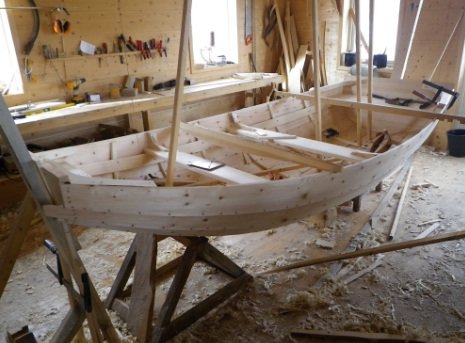
Picture: Here you see the slanting sticks attached to a beam in the roof
The boat builder must have made clear how each plank should be shaped, and furthermore know how to achieve the right shape with planks that are slightly different in buckling, thickness, density, distribution of twigs, etc. In the ancient times (and some today) would walk out in the forest, and manually pick the correct branches/trees with the correct angle to fit in each individual boat. The builder had to have the experience in selecting correct timber for the different boat materials. In the winter the timber would be cut, and in the spring cut to boat planks and other boat items. For a long time, the boat builder worked without drawings of any kind, and the eye was the most important measuring device. Still, the old boats looks really fantasticly detailed.
Take a look at this video, from the National Library of Norway
and you will se many of the old techniques in practice. You wont understand what he`s saying, but just look. You will see how much work is done manually, and how time consuming this kind of building technique is. Look at the way he uses different types of axes, and the wooden quality is superb. Quite impressive.
Since the 1960, fiberglass plastic has dominated the marked, but there are still some flourishing boat building workshops along the Norwegian coast that make sure that this ancient knowledge is not lost. Look at this one for instance: http://ulf.no/en/
I wrote this small article to create some attention to this ancient and beautifull craftmanship.
In a way, i think this product is more in tune with the nature than plastic boats:
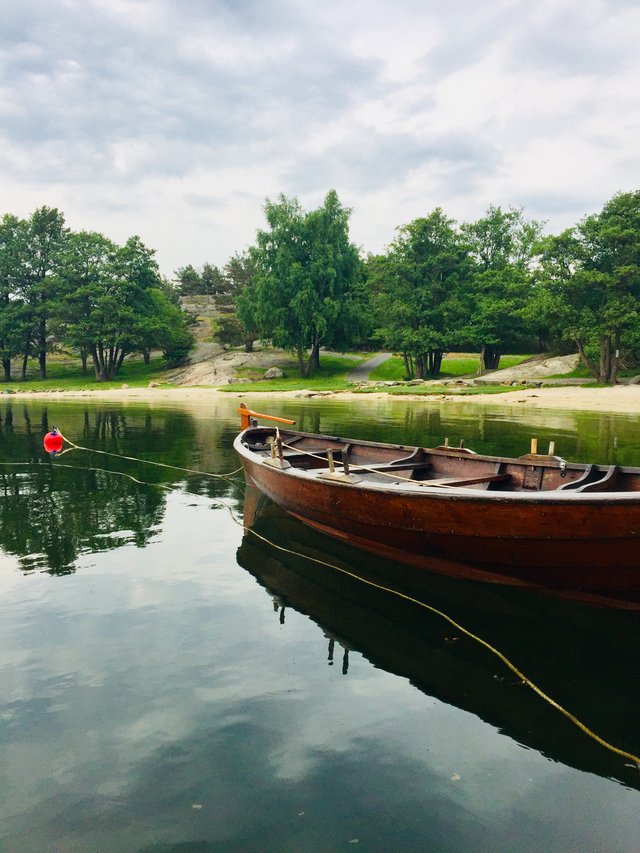
Picture: It kinda blends into the background in a way... almost looks a bit organic... dont you agree?
Congratulations @lonas! You have completed some achievement on Steemit and have been rewarded with new badge(s) :
Click on the badge to view your Board of Honor.
If you no longer want to receive notifications, reply to this comment with the word
STOPDo not miss the last post from @steemitboard!
Participate in the SteemitBoard World Cup Contest!
Collect World Cup badges and win free SBD
Support the Gold Sponsors of the contest: @good-karma and @lukestokes
Congratulations @lonas! You have completed some achievement on Steemit and have been rewarded with new badge(s) :
Click on the badge to view your Board of Honor.
If you no longer want to receive notifications, reply to this comment with the word
STOPTo support your work, I also upvoted your post!
Do not miss the last post from @steemitboard!
Participate in the SteemitBoard World Cup Contest!
Collect World Cup badges and win free SBD
Support the Gold Sponsors of the contest: @good-karma and @lukestokes
Great article.
thank you ;)